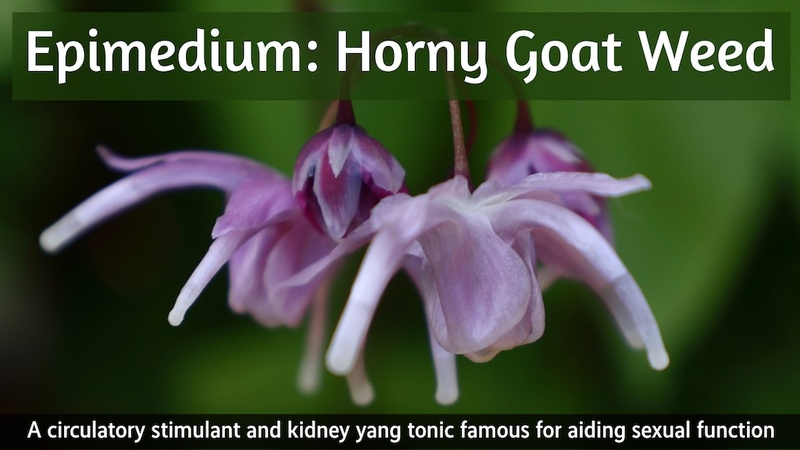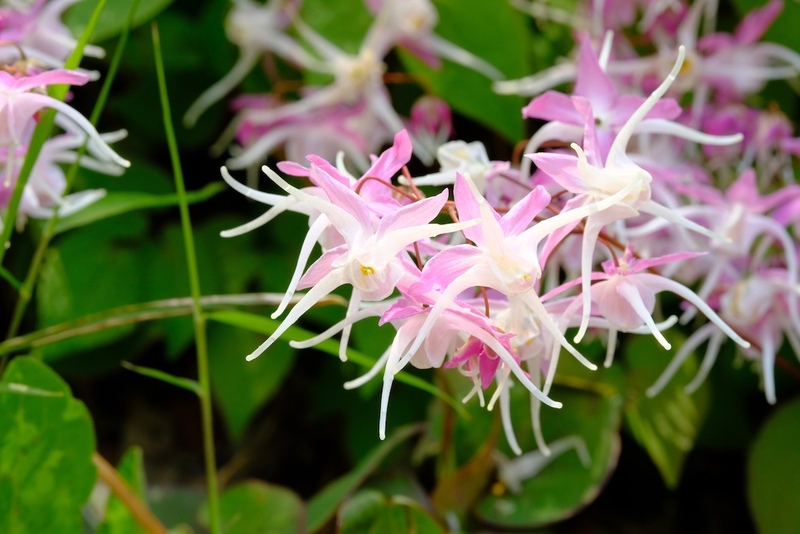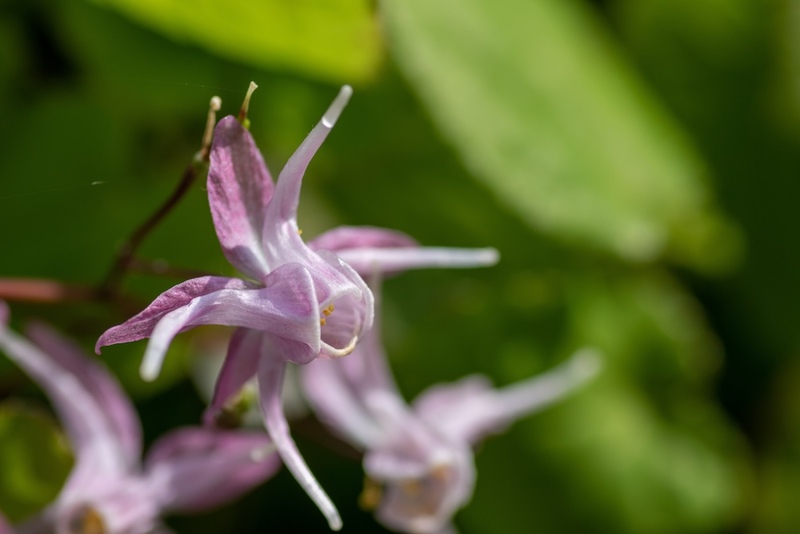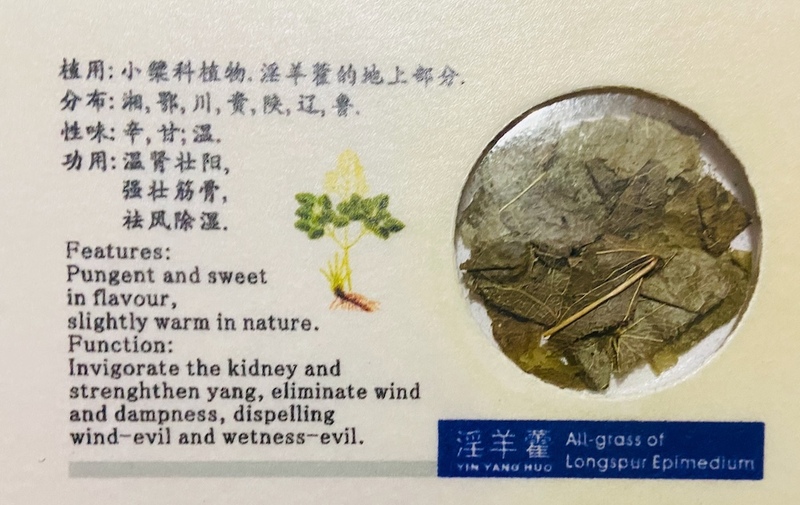
Epimedium is a genus of plants in the barberry family mostly native to Asia. The primary species used in Western herbal medicine is Epimedium grandiflorum, but a number of other species, such as E. sagittatum and E. pubescens, are also used in traditional Chinese medicine (TCM).
Various species of epimedium have been used as an aphrodisiac for both men and women for over 2,000 years. The legend is that its effects were discovered by a Chinese goat farmer, who noted how it made the goats more frisky, earning it the more common name, horny goat weed.
Icariin and Epimedium
 Epimedium is commonly used in Western formulas aimed at helping erectile dysfunction (ED). Its popularity as an herbal ED remedy is based on the discovery of a compound in the herb known as icariin, which acts as a phosphodiesterase type 5 inhibitor (PDE5 inhibitor). This is the same action found in popular drugs used to treat ED, including sildenafil (Viagra) and tadalafil (Cialis). PDE5 inhibitors cause a vasodilation in certain arteries, such as those found in the penis and lungs, increasing blood flow to these regions. Increased blood flow to the penis aids erections, and these drugs are also FDA approved to treat pulmonary hypertension because of their ability to dilate arteries and reduce blood pressure in the lungs.
Epimedium is commonly used in Western formulas aimed at helping erectile dysfunction (ED). Its popularity as an herbal ED remedy is based on the discovery of a compound in the herb known as icariin, which acts as a phosphodiesterase type 5 inhibitor (PDE5 inhibitor). This is the same action found in popular drugs used to treat ED, including sildenafil (Viagra) and tadalafil (Cialis). PDE5 inhibitors cause a vasodilation in certain arteries, such as those found in the penis and lungs, increasing blood flow to these regions. Increased blood flow to the penis aids erections, and these drugs are also FDA approved to treat pulmonary hypertension because of their ability to dilate arteries and reduce blood pressure in the lungs.
Icariin is a weak PDE5 inhibitor compared to these drugs, which is why it’s not used in modern medicine. However, herbs don’t owe their actions to one constituent. So, thinking of epimedium as a weaker PDE5 inhibitor and a natural alternative to Viagra or Cialis is a poor way to understand the plant. We can get a much better understanding of what it does and how to use it by looking at the plant’s historical uses in TCM.
Kidney Yang Deficiency
 Although epimedium is used in TCM for ED, its primary use is to support the yang energy of the kidney. It is important to understand that the Chinese concept of kidney energy is different than the Western perspective. It includes the flow of energy between multiple organs and certain body processes related to those organs.
Although epimedium is used in TCM for ED, its primary use is to support the yang energy of the kidney. It is important to understand that the Chinese concept of kidney energy is different than the Western perspective. It includes the flow of energy between multiple organs and certain body processes related to those organs.
In TCM, the concept of kidney energy includes adrenal function, sexual function, and even some aspects of structural function, because the kidney energy is said to “build the bones,” which includes the bone marrow. The kidney is also one of the major organs for housing the jing, a basic life energy. So, as a TCM yang energy tonic, epimedium supports all these processes.
Some major indications for kidney yang deficiency are ED, a lack of sexual desire, premature ejaculation, low sperm count, and infertility. Weakness or pain in the lower back and knees is also part of the picture.
Painful Obstruction Syndrome
The other major use of epimedium in TCM is the treatment of Bi Zeng (painful obstruction syndrome). This is characterized by pain and coldness in the limbs, numbness, spasms, and cramps. It is caused by wind (spasms), dampness (fluid retention), and cold (lack of energy) that are obstructing the flow of blood and energy in the body. The herb dispels the wind, cold, and dampness from the system, resulting in a normal flow of blood and qi.
Epimedium is used as part of formulas for weakness in the lower extremities, lower body paralysis, and for stiffness, numbness, or paralysis after strokes. The unprocessed herb works better to expel wind and dampness. Frying the herb in oil enhances its ability to increase kidney yang.
Conditions Benefiting from Epimedium
 Blood flow is critical to arousal and pleasure in both men and women. In both sexes, reproductive tissues become engorged with blood as arousal increases. Increased blood flow also increases sensitivity and pleasure. Epimedium improves blood flow to the reproductive tissues, but it’s doing more than that. It also aids male fertility by increasing sperm count.
Blood flow is critical to arousal and pleasure in both men and women. In both sexes, reproductive tissues become engorged with blood as arousal increases. Increased blood flow also increases sensitivity and pleasure. Epimedium improves blood flow to the reproductive tissues, but it’s doing more than that. It also aids male fertility by increasing sperm count.
In TCM, alcohol extracts are typically used to aid male sexual function, but the herb is rarely used by itself. Because of its stimulating effects, it is often combined with kidney yin tonics and/or jing tonics for a more lasting and ultimately curative effect. These remedies include dogwood fruit, Tribulus, morinda, rehmannia, and cistanches.
Epimedium has also been used for respiratory problems like bronchitis and asthma. It has an antitussive (cough suppressant) action and also acts as an expectorant. It appears to stimulate the sympathetic nervous system activity since large doses can cause dilation of the pupils and mild spasms and cramps. So epimedium has been used as a stimulant in cases of fatigue. It has also been used in China to treat the symptoms of menopausal women. For example, it may be helpful for osteoporosis. When combined with other tonic herbs, it may also have anti-aging benefits.
Using Epimedium
The TCM literature I consulted suggested a tincture or decoction for ED and sexual problems with a standard dose of about 10-15 grams a day. They don’t recommend using it by itself for more than a few weeks. It’s better as part of a formula if you’re going to use it longer than that.
The dose of the tincture would be around 30-40 drops, three times daily. The dose of the tea or decoction would be 1-3 cups a day. You can also take 1-2 capsules up to three times a day or a lower amount of a standardized extract as recommended on the bottle.
The herb is safe, with the major contraindication in TCM being people with yin-deficient fire, which probably means it's not helpful where there is chronic, low-grade inflammation. Combining it with tonics as suggested above balances its action in these situations. Also, don’t take it with other prescription ED medications such as Viagra or Cialis, as this could result in excessively low blood pressure.
Downloads
Steven's Articles
-

-
The Uplifting Fragrance of Jasmine
Jasmine lifts depression, aids self-confidence,…
February
-

-
Reishi (Ganoderma) Mushroom
A TCM remedy for calming the shen (spirit), balancing…
-

-
Eucommia Bark
A superior tonic that promotes kidney, structural,…
January
-

-
Goldenthread, Phellodendron, and Yellow Root
Three herbal remedies containing the infection-fighting…
-

-
Teasel
A traditional herb for healing bones and joints…
-

-
Barberry and Healthy Personal Boundaries
A thorny shrub for fighting infections and supporting…
December
-

-
The Evidence for Berberine
A yellow alkaloid found in traditional infection-fighting…
-

-
The Sensible Use of Caffeinated Herbs
Kola nuts, guarana, and yerba mate and other herbs…
-

-
The Health Benefits and Problems with Coffee
This popular caffeinated beverage can be beneficial…
October
-

-
Understanding Caffeine & Cellular Adaptation
Preserving the power of caffeine's buzz and the…
September
-

-
Horseradish
A pungent spice for aiding protein metabolism…
-

-
Banaba or Crepe Myrtle
A beautiful tree from Southeast Asia whose leaves…
August
-

-
Monkeyflowers
Flower essences to help see ourselves more clearly…
-

-
Mariposa Lilies
Strengthening the bond between mother and child…
-

-
The Noble Bay Leaf
A common kitchen herb for aiding digestion and…

